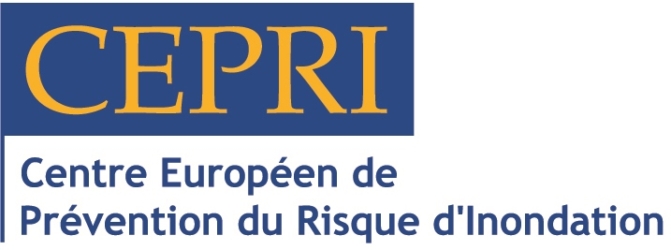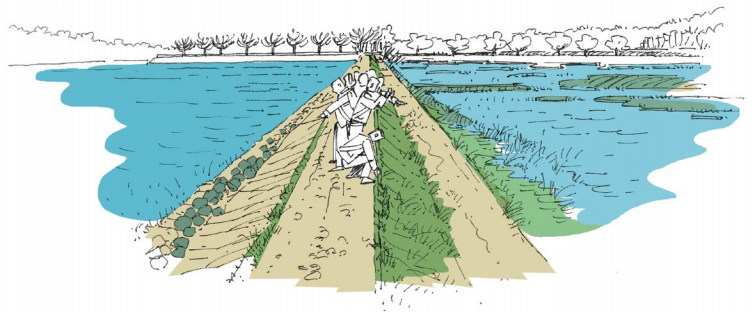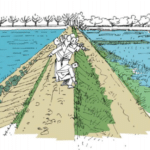
Publics concerned
Elected officials, territorial agents, state services.
What they are saying
Location
Paris, at your premises or by videoconference.
CEPRI has long attached great importance to raising the awareness of local elected officials to the risk of flooding and invites them to take preventive actions.
Considering the consequences that a flood can have on a territory, its population, its goods, equipments and activities, it is essential that the communities prepare for it and engage, alongside the State services, resolute steps of flood risk prevention.
In order to support elected officials and staff of local authorities in this sense, CEPRI, in its capacity as an officially declared professional training organization since 2014, organizes and provides on behalf of its members and all interested public organizations adapted training on flood risk management and prevention.
Each year, CEPRI draws up a calendar of professional training courses on topics related to flood risk management, which complements the methodological guides that CEPRI also publishes.
As far as human resources are concerned, CEPRI relies heavily on its internal resources. It can also call upon external contributors, agents working in the departments of its member communities, recognized for their expertise and their ability to share their experience, or representatives of partner organizations chosen to meet certain specific expectations.
A pedagogical file and our latest publications are given during the training sessions.
CEPRI is registered under the number 24 45 03100 45.
Our training courses are reserved for local authorities and government departments.
Upcoming training courses
- La réduction de la vulnérabilité du bâti aux inondations – 9 novembre 2023
- Les solutions fondées sur la nature – 14 décembre 2023
- Les outils de sensibilisation – 25 janvier 2024
- L’aléa – 14 mars 2023
- De la compétence GEMAPI à la gestion globale du risque – 28 mars 2024
- L’intégration du risque inondation dans l’aménagement – 16 mai 2024
- Les essentiels du risque inondation – 4 juillet 2023
Training catalogue
The essentials of flood risk

Prochaine date : 4 juillet 2024
In 2010, the storm Xynthia caused 740 million euros of damage and caused the death of 41 people, including 29 in the town of La Faute-sur-Mer alone.
More recently, the prevalence of flood risk was reminded to the French by the events of June 2016 during which 5 people died, the associated property damage is estimated at 1.4 million euros. In France, 17.1 million residents are exposed to the risk of flooding by overflowing rivers and about 20% of homes are affected by the risk of marine submersion. Economically, 9 million jobs are exposed to river overflows and more than 850,000 jobs are affected by the phenomenon of marine submersion. These figures show the omnipresence of the flood risk in France for which it represents the first threat of natural origin on the territory.
Taking into account the risk of flooding occurs throughout the life of a territory and concerns a multiplicity of actors who can act at different levels, following variable approaches in relation to their fields of competence.
The involvement of local stakeholders (local authorities and their public institutions, network managers, individuals and construction professionals, associations, etc.) is essential to enable the emergence of local initiatives and to feed the reflection on risk management, from prevention to crisis, but also for a return to normal under the best conditions. The tools and means available to the State do not allow to cover the whole territory nor to carry out a reflection on all the levers of flood management.
How is the flood risk defined on the territory ? What is the spirit of the prevention policy on a national and European scale ? How do the different actors deal with it ? How to adopt a global strategy involving all the actors according to their means of action ? What are the possible evolutions for risk prevention ?
This training provides answers by proposing methodological paths to better integrate the risk of flooding in local action, showing the importance of possible initiatives for everyone. It is aimed at a non-initiated audience of local actors.
Runoff
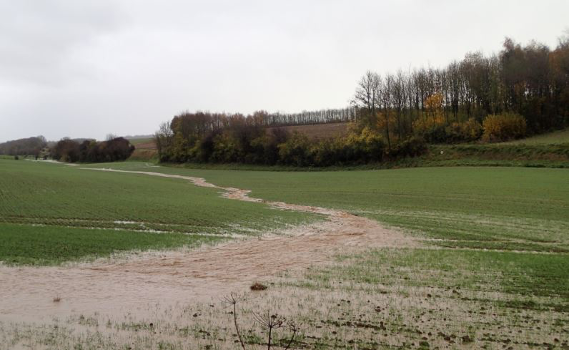
Pas de formation à venir
In both urban and rural areas, runoff is probably the most difficult type of flooding to identify and treat. Often mixed with other phenomena, runoff poses difficulties of definition, forecasting and management. Yet the risk is very real, and aggravated by the effects of climate change and increased soil sealing. The challenges of the runoff problem result in particular from the absence of a clear framework for its management, at the crossroads of different public policies, and communities often lack the tools to deal with this risk.
This training provides solutions to better understand the issue of runoff and its causes and consequences. The management of the phenomenon is also evoked, on the organizational level as well as on the operational level, and illustrated by concrete examples of actions intended to limit the runoff phenomenon.
This training is based on the experience of the CEPRI team in this field and on a certain number of case studies presented by speakers from local authorities.
The mayor facing the management of a flood crisis
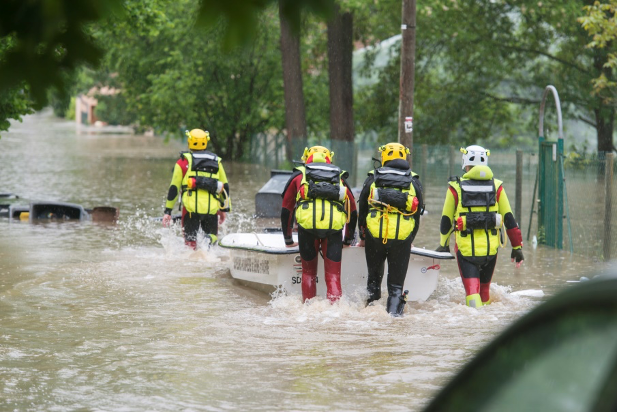
Pas de formation à venir
In France, 19,000 municipalities are exposed to varying degrees of flood risk. Faced with this risk, mayors, through their police powers, are in the front line. They also represent the local authority and, as such, the first point of contact for residents and victims in the event of a crisis. In order to be able to assume his responsibilities towards his constituents in case of flooding, the mayor, along with his municipal team and his services, must therefore prepare himself before the crisis. The objective of this training is to provide local elected officials and municipal staff with the keys to enable them to prepare to face a flood affecting their territory, by anticipating the phenomena as well as possible, by planning the response of the municipality and by preparing the inhabitants so that they adopt adapted behaviors during the event. The training is based on the experience of the CEPRI team in this field and on a number of case studies.
De la compétence GEMAPI à la gestion globale du risque inondation

From GEMAPI competence to global flood risk management The Management of Aquatic Environments and Flood Prevention (GEMAPI) competence was created by the law n°2014-58 of January 27, 2014 of modernization of territorial public action and affirmation of metropolises (MAPTAM), and has undergone many legislative and regulatory adjustments since then. It is a mandatory competence for municipalities and public establishments of inter-municipal cooperation with their own tax system (metropolises, urban communities, communities of agglomerations, communities of municipalities), since January 1, 2018.
However, the name of this competence can be misleading : the missions defined in paragraphs 1, 2, 5, 8 of article L.211-7 of the Environment Code are only a part of the flood risk prevention policy. These missions, carried out by an EPCI-FP or a mixed syndicate, do not call into question the competences held by other actors, such as the police powers of the mayor and the prefect for example. Its title does not include all the flood risks present today on the whole territory.
Within the framework of the implementation of this competence, it seems important for the authorities in charge of the GEMAPI to identify what really falls under their competence and the contours of their responsibilities in this matter. Through examples of fields of intervention of the communities, in particular land use planning and crisis management, this training aims to shed light on the repercussions of the GEMAPI on these policies. It also focuses on the latest legislative and regulatory developments, and identifies the resources to be mobilized to support communities in the concrete implementation of this competence.
Reducing the vulnerability of housing to flooding
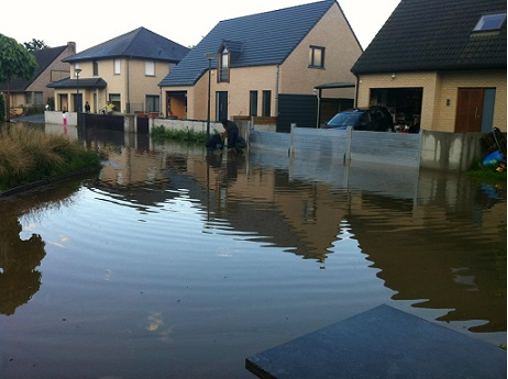
Prochaine date : 9 novembre 2023
Born some twenty years ago because of the limitations of protective structures as the only form of response to the risk of flooding, the reduction of vulnerability is a concept of risk management that is now widely shared.
The reduction of vulnerability has become an essential and indispensable line of work in the national strategy for flood risk management, and is a prerequisite for obtaining subsidies from the Barnier Fund within the framework of the flood prevention action programs (PAPI). With one out of four inhabitants living in a dwelling located in an area likely to be flooded, the reduction of the habitat to the risk of flooding has become a major issue and constitutes, as such, an important component of the PAPI. However, the implementation of this type of approach is not simple and comes up against a certain number of brakes and obstacles of various kinds.
This training aims to provide knowledge on the concept of reducing vulnerability to flooding, applied to individual housing. It details the factors of vulnerability and damage to housing in the event of flooding, as well as the vulnerability diagnoses and the technical and organizational measures that can be implemented to reduce the vulnerability of housing and their occupants.
It provides keys to communities wishing to set up a local approach to promote the adaptation of housing in their territory to the risk of flooding.
Reducing the vulnerability of activities and infrastructures to flood risk

Pas de formation à venir
Born some fifteen years ago in response to the inadequacy of protective structures to cope with floods, vulnerability reduction is a widely shared concept of risk management today. The national strategy for flood risk management has called for a reduction in vulnerability and this has become an essential part of flood prevention action programs (PAPI).
France has nine million jobs in flood-prone areas, as well as a large number of facilities and networks vulnerable to the risk of flooding. Reducing the vulnerability of activities and infrastructures is therefore a major challenge for our territories. However, the implementation of this type of approach is not simple and comes up against a certain number of brakes and obstacles of various kinds.
This training aims to provide knowledge on the concept of reducing vulnerability to flooding applied to economic activities, public institutions and networks. It details the factors of vulnerability of activities and infrastructures to flooding, the vulnerability diagnoses as well as the different technical and organizational measures that can be implemented to reduce the vulnerability of these stakes to the risk of flooding. It provides keys to communities wishing to implement a local approach to promote the adaptation of activities and infrastructure of their territory to the risk of flooding. It will be based on the experience of the CEPRI team in this field and on a number of case studies.
The integration of flood risk in development
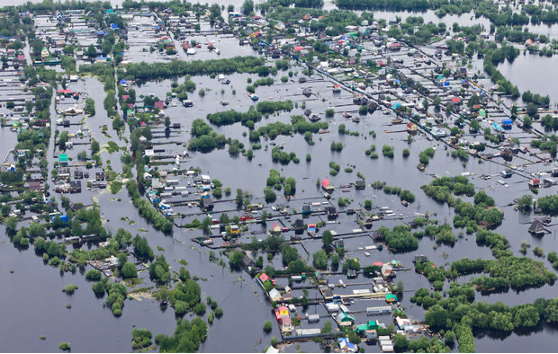
The prevention policies resulting from the Grenelle II law invite local authorities to consider the impacts that a flood may have on their territory, in order to orient their public policies, and in particular those concerning the development of their territory, in favor of reducing these impacts.
Taking into account the risk of flooding occurs throughout the life of a territory : from the planning of its development to the issuing of town planning authorizations, through the programming of works, urban renewal or even the requalification of neighborhoods, etc.
How to integrate the different flood risks in an efficient way in the planning (urbanism documents and dedicated tools) ?
When designing development projects exposed to flood risks, what principles should be taken into account ? For which concrete achievements ?
This training brings answers by proposing methodological tracks to better integrate the various risks of flooding (by overflow of watercourse, marine submersion, runoff, rising water table, …) in the tools of the right of town planning (SCoT, PLU), and in the operational projects.

